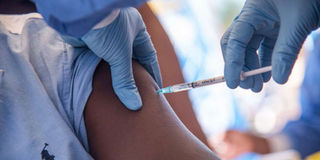Premium
How vaccines are made

Before it comes to the market, a vaccine goes through six major stages: exploratory, pre-clinical, clinical development, regulatory review and approval, and manufacturing and quality control. PHOTO | FILE | AFP
What you need to know:
- The topic of vaccines elicits so much passion among blacks because the history of their creation has not been kind to them.
A video on social media of two French scientists talking about how they would turn Africans into guinea pigs attracted global outrage.
The topic of vaccines elicits lots of passion in Africans because of historical accounts that go back to precolonial times where care was either withdrawn or pharmaceutical products whose safety was unknown were given to African slaves.
Stories are told of how the French used a toxic arsenic-based drug, atoxyl, on Cameroonians and it killed the patients.
Then there is the infamous case where the United States government let hundreds of black men go untreated for syphilis as part of a research experiment.
One would have expected that discussions of such inhumanity would have subsided by now because of development of ethical guidelines to protect human subjects in vaccine trials. The situation is far from it.
These conversations are still heated in the vaccine space, touching on equality in global health, north-south relations and decolonisation of research.
MAKING VACCINES
So how exactly are vaccines developed and would it be possible to turn Africa into guinea pigs?
It is difficult to give a yes or no answer to this question because shouldn’t the well-being of Africans be the priority in these trials?
Well, the development of public health infrastructure in Africa, which involves vaccines and the expansion of campaigns against epidemic diseases, is shaped by broader regional and international political tensions and imperatives.
DISEASES PRIORITISED
With little resources to be used for so many health challenges, the World Health Organization (WHO) has prioritised diseases that need urgent attention in terms of vaccines development. They include Crimean-Congo haemorrhagic fever, Ebola virus disease, Marburg virus disease, Lassa fever, Middle East respiratory syndrome coronavirus, severe acute respiratory syndrome, Nipah virus infection, henipaviral disease, Rift Valley fever and Zika virus disease.
In this list, there is also Disease X, a killer that may not be known yet and just comes out of the blue and terrorises mankind like Covid-19 is doing now.
The Coalition for Epidemic Preparedness Innovation is now making vaccines for five of these diseases.
THE PROCESS
Before it comes to the market, a vaccine goes through six major stages: exploratory, pre-clinical, clinical development, regulatory review and approval, and manufacturing and quality control.
The clinical development phase is what is contentious now because it is where the vaccine is given to people.
This stage itself has three phases.
In phase one clinical trials, small groups of people receive the vaccine that is being developed.
In phase two, the study goes a step further to include people who have characteristics such as age similar to those for whom the new vaccine is intended.
In phase three, the vaccine is given to thousands of people and tested for safety and efficacy.
After this stage, the vaccine is approved but just to be sure that it is safe, it undergoes a fourth phase after the vaccine is given the green light for use.
‘HUMAN CHALLENGE’
Except for the H1N1 influenza vaccine, which was developed relatively fast, perhaps because influenza-vaccine technology was well developed because the world was exposed to the flu from the 1800s, this process can take more than a decade.
Surely, by the time the vaccine is developed, we will have all died?
Now scientists are looking for a new quicker option where they would use the ‘human challenge’ study, which would involve exposing, say 100 healthy young people to Covid-19 and closely monitoring whether they will be spared from infection.
The other group would be given a placebo.
Is this ethical? Yes. Human-challenge studies have been conducted for less deadly diseases such as cholera and malaria.
Due to their financial challenges, Africans’ voices have not been magnified in the discussion about the ethics of vaccine development even though there are trials conducted on Africans.
This is slowly changing. Seeing very little participation of African countries in Africa in the ongoing trials for Covid-19, the COVID-19 Clinical Research Coalition plans to include resource-poor countries in the discussion about development of vaccines.





